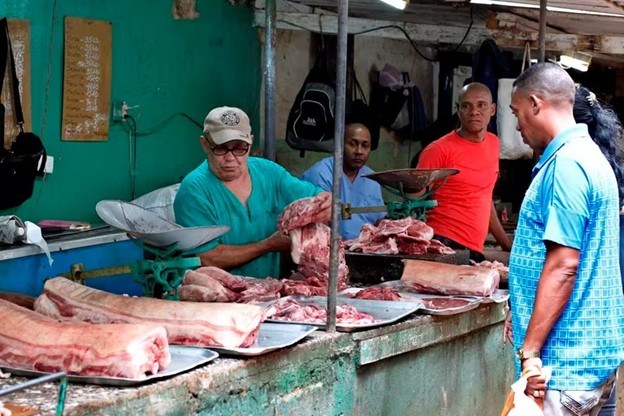
Industrial food production on the Island fell 66.7% between 2018 and 2023 leading to shortages and considerable price increases.
By 14ymedio
HAVANA TIMES – Asphyxiated by the food crisis, the Cuban Government sent the president of the Chamber of Commerce, Antonio Carricarte, to Spain this week to convince several businessmen to invest in food production on the Island. At the same time, a group of congressmen and farmers from the United States traveled to Havana to confirm their “willingness” to expand commercial exchanges.
Carricarte, who toured with several MSME [micro/small/medium sized business] owners through several cities in northern Spain such as Santander, Guipúzcoa, Lugo and A Coruña, assured that his interlocutors had shown interest in contributing to Cuban food production, since they understood the “difficulties” Cuba is going through.
Asked by the press, the senior official did not reveal which MSMEs had accompanied him on the journey. He limited himself to stating that his delegation was made up of ten companies that he described as a “public-private partnership.”
The tour, he added, aims to attract small and medium-sized Spanish companies to develop projects for “pork, milk, egg and chicken production,” a topic that interested the businesspeople he spoke with. In addition, he addressed other topics related to information and communication technologies.
For his part, the president of the Galician Confederation of Businessmen, Juan Manuel Vieites, pointed out that the visit of the Cuban delegation of businesspeople constitutes an “opportunity” to “see first-hand” that country with commercial ties with Galicia.
Galicia is the seventh autonomous community in Spain that sells products to Cuba, which represents 4% of total Spanish exports, which mainly include capital goods, automobiles, as well as foodstuffs such as fats and oils, dairy products, fish and meat.
Meanwhile, this Monday in Havana Cuban officials received a group of agricultural businesspeople and members of congress from the United States, invited to attend the 5th Agricultural Conference between Cuba and the United States, which was inaugurated at the Hotel Nacional in Havana.
“The foundations have been laid to be able to analyze and propose new work projects that satisfy the needs of both parties and expand our commercial relations to a higher level,” said the president of the Agricultural Business Group of Cuba, Orlando Linares, at the opening. He alleged, following official rhetoric, that the main obstacle to the development of the Island is the ’blockade’*.
Meanwhile, the president of the United States-Cuba Agricultural Coalition, Paul Johnson, expressed his desire that the meeting be a setting for mutual listening, as well as learning and returning with concrete actions such as a trade agreement.
The debacle of the Cuban food industry is no secret. Figures offered last week by Cuba’s National Office of Statistics and Information (Onei) allow the quantification of the collapse suffered in just five years: industrial food production fell by 66.7% just between 2018 and 2023.
Among the data revealed, the drop in pork stands out, which is of great importance in the Cuban diet, and which went from 149,400 tons to 13,300, a 91% drop in five years.
Rice fell 90%, from 272,800 tons to only 27,900. The last five years were also disastrous for coffee and milk, essential in the national culture, and which registered drops of 51% in the case of coffee and 90% in regard to evaporated milk, while the production of whole precooked frozen food fell 49.6%.
The production of bread has dropped from 493,700 tons in 2018 to 326,300 in 2023, a 34% drop, a fact aggravated by its being a basic and essential product. Looking at the decline of each of the 23 foods analyzed in the official report in detail, reveals that beef fell 58%, cheese 52%, canned tomato 76.5% and unsalted butter 76%, just to mention a few more. Only canned meats (33%) and lobster tail (20%) show smaller drops.
——-
*Translator’s note: There is, in fact, no US ‘blockade’ on Cuba, but this continues to be the term the Cuban government prefers to apply to the ongoing US embargo. During the Cuban Missile Crisis the US ordered a Naval blockade (which it called a ‘quarantine’) on Cuba in 1962, between 22 October and 20 November of that year. The blockade was lifted when Russia agreed to remove its nuclear missiles from the Island. The embargo had been imposed earlier in the same year in February, and although modified from time to time, it is still in force.
Translated by Translating Cuba.
Read more from Cuba here on Havana Times.




